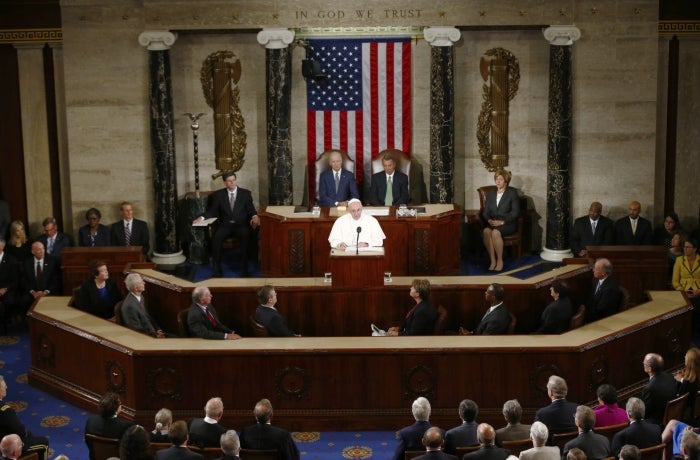Patrick Gannon: Death by government
Published 10:21 pm Monday, September 28, 2015

- Pope Francis addresses a joint meeting of Congress . AP photo
RALEIGH – When Pope Francis addressed Congress last week, one of the loudest and longest rounds of applause came after he said the Golden Rule reminds us of the responsibility to protect and defend human life at the early stage of development.
But the pope then said he has supported the global abolition of the death penalty since the beginning of his ministry.
“I am convinced that this way is the best, since every life is sacred,” Pope Francis said. He continued: “Society can only benefit from the rehabilitation of those convicted of crimes.”
Not surprisingly, those words received a much shorter and quieter applause from Congress than the pro-life comments.
But the pope made his point. If life is sacred inside the womb to those who oppose abortion, then why do some of those same people believe it can be taken outside the womb at the government’s hand?
A Republican member of the N.C. General Assembly made the same point during a news conference last week, staking out a position not popular among his colleagues.
“Also, most Republicans profess to be pro-life, and I think someconservatives are wondering whether being pro-life and supporting the death penalty is consistent,” said Rep. Jon Hardister of Greensboro.
The conservative Hardister held a press conference to state his opposition to the death penalty. With him was Nebraska state Sen. Colby Coash, also a Republican. Coash led the charge for the repeal of that state’s death penalty earlier this year.
Hardister believes it’s logical for conservatives to oppose the death penalty.
It’s inefficient and expensive, many people have been exonerated from death row, executions have been botched across the country and there is no clear, consistent evidence that the death penalty deters crime, he argued. He believes death sentences should be replaced with life in prison without the possibility of parole.
Coash said he first started to oppose the death penalty when he attended an execution at the state penitentiary as a college student. Those who wanted the convict to die partied in the parking lot, with a barbecue and a band. They counted down the execution as if they were counting down on New Year’s Eve.
“And I said to myself at the time, ‘This isn’t the way it’s supposed to be. We’re not supposed to be celebrating death in this way,” Coash said.
To believe in the death penalty is to trust the government is going to get it right, Coash said. Nebraska state officials had a long discussion about what power they wanted to give state leaders and state government.
“The death penalty just tipped us over the edge,” he said.
Ernie Pearson, a Raleigh attorney and founding member of Conservatives Concerned About the Death Penalty in North Carolina, brought the conversation back to Christianity. He said he led a prison Bible study and has seen criminals with lengthy sentences make very sincere changes in their lives.
“If we stand for right-to-life and believe that an unborn infant is entitled to an opportunity to breathe their first breath and become all they can be, we do not have the right to take away a person’s life if there’s any chance that God can redeem them, and there’s always a chance,” Pearson said.
The political courage of Hardister and Coash should be commended.
The time has come for a serious talk about whether capital punishment is right for North Carolina. Maybe politicians need to do more than applaud the values they say they support.
Patrick Gannon writes columns for Capitol Press Association.

